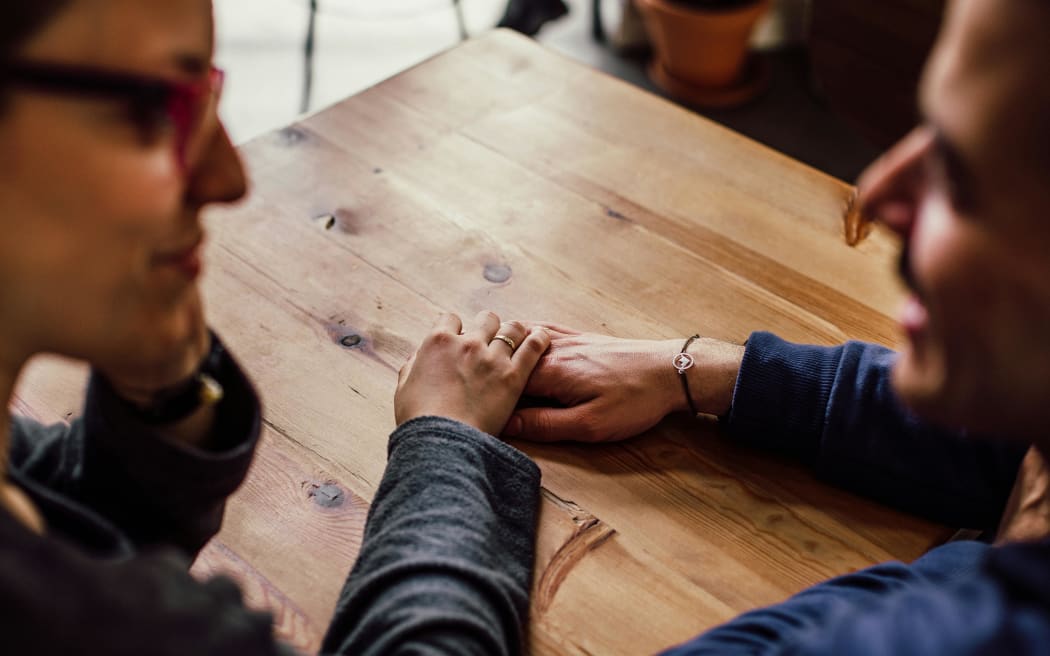A year on from a divorce or long-term relationship breakup is about the right time to enter the dating world, says Auckland sex therapist Jo Robertson.
"If it's too early you haven't been given enough time to reflect and grieve and feel pain. Also, if you've got kids in the picture, they haven't had enough time to grieve and to reflect. So yeah, I think a year - without wanting to create rules - is about a good time to start thinking about it," she tells Kathryn Ryan.

Photo: Public domain
Jo Robertson appears as a relationship expert in the upcoming season of Married at First Sight NZ, screening on Three and ThreeNow from Sunday 26 May.

Sex therapist and porn researcher Jo Robertson Photo: Supplied
Treat dating like an experiment
In an experiment, the outcome is unknown and somewhat out of your hands, Robertson says. Expect dating, at first, to be somewhat uncomfortable.
"If you haven't been on the dating scene and going out for coffee or drinks with somebody for 20 years, then that's going to be a weird time. And it's going to be weird until it's a muscle that you've learned to work again. It wasn't weird back in the day because it was a muscle you worked and it'll be the same again.
"It's not 'Do they want me?' or 'Do I want them?' It's like 'Does this thing work? Would this work in my life?"
Be clear about what you want
Everybody has things that they don't want to compromise on in a new relationship, Robertson says.
After a year or so of being single, you'll have a better handle on what went wrong in your last one and what your non-negotiables are going forward.
"If you feel you can, be vulnerable and honest, open about what you want. Probably being clear, more specifically about what you want would be good, whether it's something committed and long-term, whether it's something casual."
For some people, brief encounters can be a way of "reclaiming" a part of themselves that may have been lost.
"People post-separation or divorce, particularly women, they've maybe had some really hard years there, maybe they've done the grind of having kids and having teenagers, maybe they haven't had the most supportive partner. And then they just want fun, they want play, they want to enjoy life again. And so they find ways to do that, maybe with other people's bodies or their own, or they go on big trips, or whatever it is that they do. But they're kind of reclaiming the spirit of fun in themselves.
"It's important to just be really honest with both yourself and anyone else about what it is that you want so that nobody gets hurt in this process. That's what we want to avoid. So if you are just looking for fun and want some casual relationships, then be clear about that at the beginning, so nobody else ends up being wounded by the fact that you're not up for commitment."
Reflect so you can be real
It's important that people reflect on what went wrong - including what they might have done wrong - in their previous relationship.
"It's a pretty big red flag for me if somebody can't own anything. What would you do differently next time? I think this is a really critical piece. Because otherwise there's blind spots and that will just come up again.
"There's you as a person and then there's your life that surrounds you. It might be that somebody really wants you as a person but the life that surrounds you doesn't really complement or work well with this.
"If something doesn't work out, it's not necessarily that you don't like each other as people. There are two separate things always happening in those later years - there's you and then there's the life around you. And those lives don't necessarily work well together."
"If they're willing to negotiate and navigate that tricky stuff with you - property and money and childcare and all the things - then those are some green flags, that's good. If they get defensive, if they feel like you're rejecting them then that's not great, and maybe they're best as a casual fling.
"It's not just about you as a person, it's also about the life that you bring. It's not just them as a person. It's also the life that they bring. It's so different to being 20."
Take a chance on a second date but not on your safety
Unless there's a "really significant" indicator that a relationship wouldn't work, Robertson recommends trying out a second date.
"Going on dates, people often quite nervous on their first and they might not present the best versions of themselves. And we can be quite quick to jump ship really, really fast if we've gotten any sign of a red flag or something.
"Two dates means that you've really given everybody a shot … It also means that you say yes more often.
"A lot of people might get asked out for a drink or something but they're like 'oh, no, that person is not my type' or 'it's too awkward'. They come up with some kind of barrier or excuse. Say yes unless there's a massive red flag."
From a safety perspective - for women especially - Robertson recommends meeting a new person a couple of times in public spaces before you meet them in private.
Don't assume that if you are perimenopausal or postmenopausal you don't need to worry about contraception - STIs can be contracted at any age.
Talk about your kids straightaway but wait a while to introduce them
Unless you're looking for casual sexual encounters, people need to know that they're dating someone with children, Robertson says.
"Get right in there, have that photo on your dating profile of the backs of the heads of your children or something."
She recommends not introducing a new partner to your kids (18 and under) until you know it's a long-term relationship, at minimum four months in.
"It's quite a lot going from having a single parent to having another person sleeping over in the bed with their parent so don't do that for another few months, I would say."
Always let your ex-partner know in advance that you're introducing someone to the children, Robertson says, and keep them "in the loop".
"Just to be really respectful, ask your ex-partner if they're okay with your new person, doing any babysitting, looking after the kids alone. That's another respectful thing to do, that's important.
"Be honest with your kids, depending on what age they are, that this is a new relationship - that you're still figuring it out - and that not every relationship lasts but you're doing your best so that they don't go in with this idea of this is going to be moms or dads forever person. Be more upfront with them about what relationships look like in later life."

